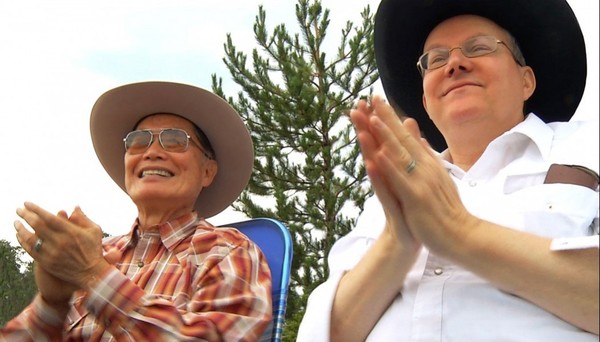Review: TO BE TAKEI Is Okay, By George

This also summarizes the new George Takei documentary, To Be Takei. Japanese internment camps, gay rights, and Star Trek - it's pretty safe to say that those who know Takei best from his popular Facebook comedy posts will be getting a different Mr. Sulu. But nevertheless, To Be Takei is well-edited and easily digestible, even for a straight Caucasian non-Trekker such as myself.
Don't get me wrong, a sense of humor is certainly evident in the film. It's just not in league with the sharpness, creativity, and wit on display each day on Takei's Facebook page (currently at a staggering 7,356,514 likes). Takei has admitted that he hires "George Fakei"s to generate many of these one-liners and memes, although this film's brief portion on the page's meteoric popularity doesn't mention that fact. Perhaps this omission is evident of director Jennifer M. Kroot's glaring admiration for her subject trumping the need to portray Takei in a more "warts and all" manner.
To Be Takei is a well-constructed, well-orchestrated piece of work. In its sheer watchability, it functions more as a platform for Takei's cause (gay rights) as well as a career tribute (not undue), and finally, as a place for the actor to come clean about perpetuating unflattering Japanese stereotypes back in the day, when he took a few unfortunate roles in Jerry Lewis movies. Certainly the undiscerning viewer will come away a bigger Takei fan, perhaps with an inflated sense of his career, beyond the level of semi-recognizable character actor.
Kroot's TV-ready love letter to George Takei does a good job of humanizing his relationship with his husband Brad Altman, even if Brad is never entirely comfortable on camera. (He gives valiant efforts in interviews, and comes off well.) It also serves as an effective visual fleshing-out of his aforementioned speech, bringing a healthy attention to the often overlooked reality of the WWII Japanese internment camps - one of the most disgraceful moments in U.S. history.

Regarding Takei personally, however, Kroot perhaps could take a cue from Steve James' Roger Ebert documentary, Life Itself. It is rare in its fullness, spending almost as much time detailing its subjects faults and stumbling blocks as it does charting his successes. Life Itself arrives at an all too human place through its unforgettable sharing, ultimately rendering the film critic Ebert all the more relate-able, all the more understandable.
To Be Takei, by contrast, is all about boosting its subject via a velvet steamroller approach. I suppose that on the one hand, at the tail end a long life of persecution both actual and dreaded, such lauding might be due. But on the other hand, such treatment is continually threatening to drag the otherwise agreeable To Be Takei into the realm of rainbow puff-piece.

Director Kroot is all too happy to thread the needle of what is ultimately a gay rights advocacy piece with just enough Star Trek to appease that fan base. Fellow cast-mates Leonard Nimoy, Nichelle Nichols, Walter Koening, and William Shatner are among the interviewed. And while the ever-toupeed Shatner's visible discomfort as he repeatedly denies any type of friendship with Takei is played up, my own biggest shock was seeing Koening fully bald and unrecognizable. It is nonetheless nice to see that Koening, Nichols and Takei, the three supporting Trek cast member who were perpetually sharing third-tier footing, are still close friends after all these years.
It is, however, the occasional inclusion of Howard Stern that lends the film a feeling of no-stone-left-unturned completion. Although not interviewed on camera, Stern, via video footage of one of Takei's regular radio appearances, brings a refreshing counterweight to the whole project, what with his unending humorous jabs and prodding. Kroot's willingness to begin the film with Stern's scoffing dismissal of this whole "George Takei documentary" not only deflates any of our own possible skepticism about the validity of the project, but demonstrates a certain fearlessness in the self-mocking.
In his twilight years, Takei is showing no signs of slowing down. Through his activism -- at one point, upon learning that the word "gay" was banned, he offers his own name as a replacemen; hence, this film's title -- and approachability, he's boldly going where few character actors have gone before. At warp factor nine!
And as cliched and Tak-EEE as that last sentence is, To Be Takei, in reflecting upon the only-in-this-era kind of post-fame fame that Takei is cultivating and enjoying, completely invites it.
To Be Takei opens in theaters and via On Demand platforms (including iTunes and Amazon Instant Video) on August 22.
To Be Takei
Director(s)
- Jennifer M. Kroot
Cast
- George Takei
- Brad Takei
- Walter Koenig
- William Shatner

Do you feel this content is inappropriate or infringes upon your rights? Click here to report it, or see our DMCA policy.






